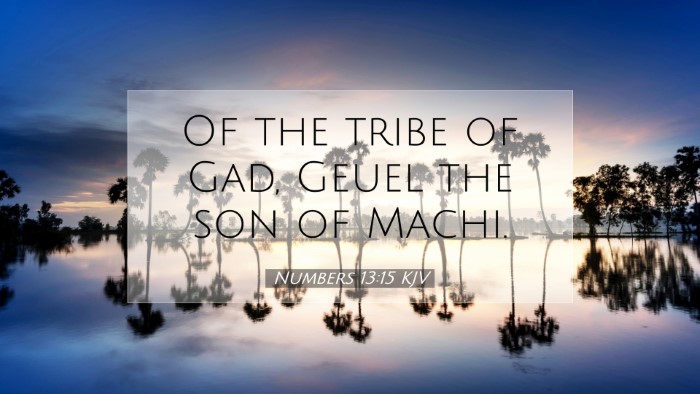Bible Commentary on Numbers 13:15
Bible Verse: Numbers 13:15 - "Of the tribe of Manasseh, Gaddi the son of Susi."
Introduction
The passage of Numbers 13:15 introduces Gaddi, a leader from the tribe of Manasseh, who is one of the spies sent to survey the land of Canaan. This verse, while seemingly straightforward, contains rich implications for understanding leadership, trust in God, and the significance of the tribes of Israel. This commentary synthesizes insights from notable public domain commentaries, aiming to provide depth for pastors, theologians, and scholars alike.
Contextual Background
Numbers 13 presents a pivotal moment in the narrative of Israel's wilderness journey. The Israelites are on the brink of entering the Promised Land after years of wandering. They are commanded by God through Moses to send representatives from each tribe to explore Canaan. This action reflects a critical juncture where faith intersects with human action, a theme that resonates through the entirety of Scripture.
Significance of the Tribe of Manasseh
The tribe of Manasseh, one of Joseph's sons, holds a unique position in Israel's history. As a half-tribe, Manasseh was divided into two portions— one on each side of the Jordan River. The selection of Gaddi to represent Manasseh emphasizes the diverse and unified representation of God's people as they prepare to claim His promises.
Leadership Principles from Gaddi
Gaddi, the son of Susi, stands as an archetype of leadership. In the act of choosing a representative from each tribe, we observe God's design for communal participation in pivotal moments. Several principles emerge regarding Gaddi's representation:
- Service to God: Gaddi's selection serves as a reminder that leaders are called to serve God. His role was not merely administrative; he was to be an instrument of God's divine will.
- Accountability: The leaders chosen were accountable not only to the people but primarily to God. This concept resonates deeply in pastoral ministry, where leaders are called to act with integrity and faithfulness.
- Faith over Fear: The task assigned to Gaddi required a faith-based perspective. As he and the other spies traversed the land, the challenge was to view the circumstances through a lens of faith instead of fear—a pressing lesson for all believers.
Insights from Commentaries
Matthew Henry's Commentary
Matthew Henry emphasizes the meticulous nature of God’s arrangements. He notes that the spies were sent not only to assess the land's fertility but also to gauge the strength of its inhabitants. The mention of Gaddi, whom Henry refers to as "one of those that went to spy out the land," indicates God's intention for each tribe to have representation, reflecting divine order and encouragement for communal engagement in pursuit of God's promises.
Albert Barnes' Notes
Albert Barnes elaborates on the selection of leaders from each tribe being significant not just for the immediate task but for the broader narrative of Israel's identity. He points out that Gaddi's name, which can mean "my great fortune," symbolizes the blessings in aligning oneself with God’s direction. William’s insights draw stress on the qualifications for leadership—the importance of character in fulfilling God-given roles as showcased through Gaddi’s selection.
Adam Clarke's Commentary
Clarke discusses Gaddi's heritage, illustrating how leadership within the tribes was deeply rooted in family lineage, a significant aspect in ancient Israel. He interprets the lineage of Gaddi and his father Susi as indicative of a lineage of faith, emphasizing the importance of familial faith that extends across generations. Clarke highlights how the biblical narrative often depicts leaders emerging from a context of divine calling and communal recognition.
Theological Reflections
This brief mention of Gaddi invites deeper theological reflection. The act of scouting the land—one of promise, victory, and challenge—underscores the Christian journey. There are several theological insights worth considering:
- Divine Sovereignty: The choice of spies reflects God’s sovereignty in choosing leaders for specific tasks. Each representative serves a divine purpose that transcends their individual capacities.
- Faith’s Challenge: The report on the land was crucial. Even as we go forth, the challenge often lies in holding fast to our faith amid daunting circumstances.
- Community and Leadership: Gaddi’s inclusion demonstrates the necessity of community involvement in decision-making processes, which should be a guiding principle in church leadership today.
Conclusion
Numbers 13:15 serves as a microcosm of God's greater plan for Israel as it stands on the brink of the Promised Land. By examining the character of Gaddi and the context of his selection, we glean lessons in leadership, faith, and communal responsibility. The insights provided by Matthew Henry, Albert Barnes, and Adam Clarke guide us into a deeper understanding of how these ancient truths resonate with modern practitioners of faith. For pastors and theologians, the exploration of this passage reiterates the sacred trust of leadership and the importance of faith in God's promises. In our contemporary context, may we boldly embody these principles as we continue to pursue God's calling in our lives and ministries.


